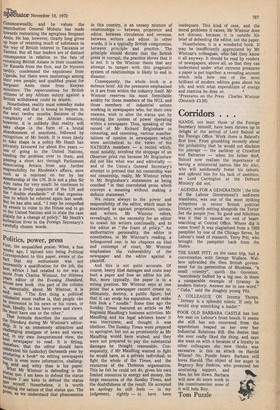Politics, power, press
First, the unqualified praise. When, a few Weeks ago, I tiptoed into being Political Correspondent to this paper, aware of the fact that my enthusiasm was not necessarily a qualification for the job, the beat advice I had retailed to me was a quote from Charles Wintour, for thirteen Years editor of the Evening Standard, Whose new book this part of the column Is,. essentially, about. Mr Wintour, it is said, said, "The first thing a political e,_clumnist must realise •is, that people can De interested in his news or his views, or !).coth. Ideally, he can have news and views. -tla must have one or the other." That formula describes the success of th! Standard during Mr Wintour's editorsh1P. It is an immensely attractive and challenging amalgam of news and views; nd, in my own inexperienced view, the u,,est newspaper to read. It is fitting, Laerefore, that the editor should have celebrated his (unlucky) thirteenth year by Prn.ducing a book* on editing newspapers hich is even more informative, challengIng, acid and witty than is his paper. What Mr Wintour is defending is the ttatas quo. I am keen to defend the status uecause I am keen to defend the status „qu° myself. Nonetheless, it is worth 'ecalling the nature of that status quo. The Press, as we understand that phenomenon in this country, is an uneasy mixture of relationships — between proprietor and editor, between circulation and revenue, between writers and editor. In other words, it is a typically British compromise, between principle and practice. The principle should dictate that the British press is corrupt; the practice shows that it is not. It is the Wintour thesis that any attempt to tamper with this pragmatic system of relationships is likely to end in disaster.
Consequently, the whole book is a defence brief. All the pressures emphasised in it are from within the industry itself. Mr Wintour reserves his most formidable acidity for those members of the NUJ, and those members of industrial unions working in newspapers who, for their own reasons, wish to alter the status quo by revising the system of power operating within a newspaper. Thus, speaking of the record of Mr Richard Briginshaw in censuring, and censoring, various manifestations of opinion in newspapers which were antithetical to the views of his NATSOPA members — a record which, most notably, involved the stoppage of an Observer print run because Mr Briginshaw did not like what was said editorially — and of the Union's General Secretary's attempt to pretend that his censorship was not censorship, really, Mr Wintour refers to Mr Briginshaw's statements as being couched "in that convoluted prose which conveys a meaning without making a definite statement."
We return always to the power and responsibility of the editor, which must be maximised as against proprietors, unions, and writers. Mr Wintour refers, revealingly, to the necessity for an editor to cosset his writers continually, and to the editor as "the fount of policy." An authoritative personality, the editor is nonetheless, in Mr Wintour's reading, a beleaguered one: in his chapters on libel and contempt of court, Mr Wintour emphasises the vulnerability of the newspaper and the editor against a plaintiff.
And this is not quite accurate. Of course, heavy libel damages and costs may hurt a paper and lose an editor his job. But, more typically, the paper is in a strong position. Mr Wintour says at one point that a newspaper cannot create or, ultimately, destroy, a public figure; but that it can erode his reputation, and make him look a "noodle." Some time ago the Sunday Times featured an article on Mr Reginald Maudling's business activities. Mr Maudling and his legal advisers knew it was inaccurate; and thought it was libellous. The Sunday Times were prepared to apologise, but not as prominently as Mr Maudling would have wished; and they were not prepared to pay the substantial damages he thought reasonable. Consequently, if Mr Maudling wanted to fight he would have, as a private individual, to fight the whole of the Times, and the resources of the Thomson organisation.
This he felt he could not do, given his own limited resources in energy and money, the large resources of the Sunday Times, and the doubtfulness of the result. He accepted an apology he still feels — in my judgement, rightly — to have been inadequate. This kind of case, and the moral problems it raises, Mr Wintour does not discuss; because it is . outside his brief of defending the editor, not the paper. Nonetheless, it is a wonderful book. It may be insufficiently appreciated by Mr Wintour's colleagues, who feel they know it all anyway. It should be read by readers of newspapers, above all, so that they can understand under what extreme pressures a paper is put together: a revealing account which tells how one of the most brilliant of modern editors goes about his job, and with what expenditure of energy and stamina he does so.
*Pressures on the Press Charles Wintour (Deutsch 0.50)


















































 Previous page
Previous page